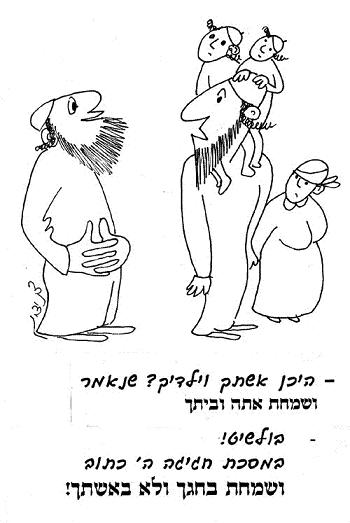
According to the laws of the Torah one must visit the Holy Temple (make a pilgrimage) three times a year, for it is written “Three times a year all your males shall appear before the Lord your G-d in the place which He chooses: at the Feast of Unleavened Bread, at the Feast of Weeks, and at the Feast of Tabernacles” (Deuteronomy 16:16). The early sages (Tanaaim) exempted women, slaves, and minors from this commandment. Though minor boys, under the age of 13, are exempt from visiting the Holy Temple, the sages obligated their parents to teach them to perform this commandment by bringing them to the Holy Temple. From what age must a minor boy visit the Holy Temple? Answer: According to the study hall of Shammai it is from the age at which a boy can ride his father’s shoulders from the outskirts of Jerusalem to the Holy Temple. One of the scholars, Rav Zira, asked why the early sages used this distance, from the outskirts of Jerusalem to the Holy Temple. Does the child not have to be brought from his home to the outskirts of Jerusalem? Who must bring him to the outskirts of town? Answer: His mother. Though she is exempt from visiting the Holy Temple, since the law “And you shall rejoice with your household” requires that she accompany her husband at least until Jerusalem. To do so, she must bring her small child with her. Once they have reached the outskirts of Jerusalem, the study halls of Hillel and Shammai disagreed on which minor children must visit the Holy Temple as well.
One of the sages, Rabbi Judah the Nasi, argued against the view of the study hall of Shammai and those who think that a minoe is one who can ride his father’s shoulders. Channah did not accompany her husband Elkanah on his visit to the Holy Temple, arguing that Samuel was too small and still needed to nurse. “But Hannah did not go up, for she said to her husband, ‘Not until the child is weaned; then I will take him,’ (I Samuel 1:22). Couldn’t Samuel have ridden his father’s shoulders?! This implies that the age of the minor is as the study hall of Hillel had it: from the age when he can walk there holding onto his father’s hand. Answer: Channah was a fretful mother and feared Samuel would become ill along the way so she did not take him to the House of the Lord though he could have ridden his father’s shoulders.
The scholars asked: A minor boy who is temporarily blind but who will in the future be able to see — are his parents obligated to educate him in the fulfillment of the commandment to visit the Holy Temple? Answer: Since a grown man who is temporarily blind but will, in the future, see is exempt by Torah law from visiting the Holy Temple (though the sages’ edicts obligate him to visit the Holy Temple), a minor boy is likewise exempt from visiting the Holy Temple.
(Babylonian Talmud, Tractate Chagigah 5b-6a)
